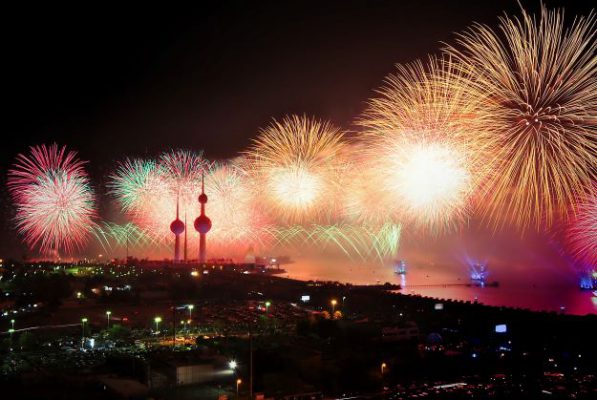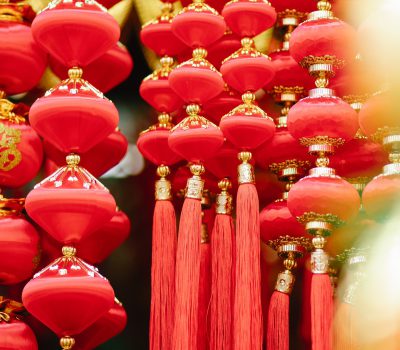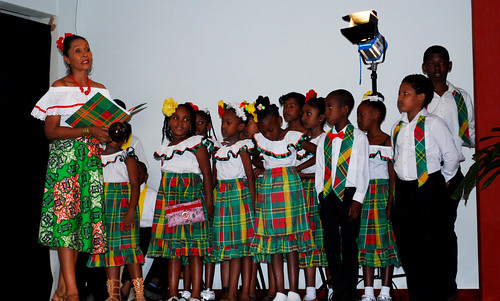Holiday Traditions
December 15, 2022
Recently we found ourselves discussing local holiday traditions. Surprisingly we found it a bit challenging to identify uniquely Trinbagonian traditions. Perhaps because we identify more with modern traditions? Or perhaps it was a case of instant amnesia when faced with such a simple question? Whatever the reason, we eventually remembered the tradition of eating black eyed peas and rice to bring in the New Year. Can you think of any others? Well given our regrettable lapse in memory, we decided it would be interesting to identify and compare a few holiday traditions for each of our taught languages. It may well surprise you to see the similarities between traditions regardless of language or culture.

Christmas and New Year’s might not immediately come to mind when thinking about holiday traditions in the Arabic-speaking world. Truthfully, while many Arabic-speakers practice Islam, there are also those who practice Christianity, as well some who are more secular-minded. In fact, in 2018, the National Geographic listed Beirut, Lebanon, as the seventh city in their list of Top 10 New Year’s Eve celebrations. In Lebanon, New Year’s Eve is a festive time. People flock to Nejmeh Square, in the capital, to watch the amazing fireworks display. It is also not uncommon to see people decorating their homes, businesses and streets with holiday decorations. In Iraq, Christmas Day is celebrated in a more traditional fashion.
It is customary for families to read the account of Jesus’ birth from the Bible (in Arabic). Everyone listening to the reading, holds a candle which, following the reading, is used to light a bonfire. A pile of dried thorns is added to the bonfire. Once completely burnt the family members take turns jumping over the ashes as they make their wishes.
Do not quickly conclude that the Chinese do not observe holiday traditions with as much vigour as the rest of the world. Historically, the Chinese do not observe Christmas, though a modern trend has been to gift apples to wish peace on the recipient. The most important holiday, though, is the Chinese Spring Festival, or the Chinese New Year. It celebrates the end of winter and the coming warmth of spring, according to the Chinese Lunar Calendar. These 16 days (January 21 – Feb 5, 2023) of festivities are marked by house cleaning and putting up red lantern decorations. People also visit their friends and family, and eat dumplings. The festivities culminate with the Lantern Festival. During this time, children look forward to receiving monetary gifts in red envelopes, called 红包 (hóng bāo).

Like in many other cultures, this is a time for family, reflection and planning for the future. Many Chinese make a concerted effort to return to their hometowns, regardless of the distance. So if you have the chance to engage with the Chinese-speaking community locally or during your travels, be sure to wish them: 春节快乐 (chūnjié kuàilè) (Happy Spring Festival)! and “新年快乐 (xīnnián kuàilè) (Happy New Year)!

In the English-speaking world, holiday traditions are somewhat similar. They centre around food, putting up decorations, gift-giving, spending time with family and friends. And for the religiously-inclined, attending church services. In Canada and the United Kingdom though, there is one particular holiday tradition that is not for the faint at heart. Some Canadians and Brits do a polar bear swim, in which they dress up in silly costumes and jump into the winter sea for charity. While in Canada this custom shifted from a Christmas Day to New Year’s Day event, in the UK, some people brave the chilly seas on Christmas Day, Boxing Day and New Year’s! Interestingly, in South Africa, the holiday season falls during their summer time. So unlike other cultures, their festive season is naturally vibrant and colourful, and involves a lot of outdoor activities.
Schools and many businesses close for the entire month of December, allowing families to plans trips to the beach and to go camping. Rather than a traditional Christmas dinner, South Africans look forward to Christmas lunch, which takes the form of an outdoor barbecue. It is common for their spread to include turkey, duck, roast beef along with mince pies, yellow rice, raisins, and vegetables. And what’s a Christmas lunch without dessert? Christmas plum pudding, crackers and the traditional malva pudding are the norm. If English is not your first language, then these greetings will be useful to you internationally, Merry Christmas, Happy Holidays and Happy New Year!
For the French, both in metropolitan France and francophone countries, the holidays are a time for family, friends, food and a plethora of quaint traditions. Weeks before Christmas Day, people in the French West Indies and French Guyana participate in Chanté Nwel (carolling). They sing carols in Creole and French, play drums, dance, eat and drink together. In metropolitan France, Christmas markets are very popular. The fast-paced city life slows somewhat as people visit the markets to buy artisanal gifts, eat châtaignes grillées (roasted chestnuts) and drink du vin chaud (spiced, mulled wine).

Le Réveillon (Christmas Eve) is the main event during the holidays. Families get together for a long dinner around a decorated table. Among the delicacies at this time are smoked salmon, oysters, foie gras (liver paté), turkey with chestnuts, cheese platters, salad and, for dessert, the traditional chocolate log, la bûche de Noël. Check out this video to learn more about Christmas in France. Don’t know how to say Merry Christmas or Happy Holidays in French? Try Joyeux Noël or Bonnes fêtes!
These holiday traditions across cultures are fascinating, don’t you think? In part two, we will explore our other taught languages. Interested in learning more about the cultures of the languages taught at the CLL? We will be happy to help you broaden your cultural understanding of others. Beginning in January 2023, our course offerings will include, Arabic, Mandarin Chinese, French, German, Japanese, Portuguese, Spanish and Yoruba. We will also continue to offer courses in English as a Second Language for speakers of languages other than English. Classes will be delivered either face-to-face or remotely via Zoom. Registration begins on January 3, 2023. For more information visit our website: Non-University Students | UWI STA Centre for Language Learning or email us: cll.fhe[@]sta.uwi.edu.
The Centre for Language Learning
The University of the West Indies
St. Augustine
Trinidad and Tobago
E-mail: CLL.FHE@sta.uwi.edu
Tel: (868) 662-2002 ext. 82524
Copyright © 2012-2024 |


